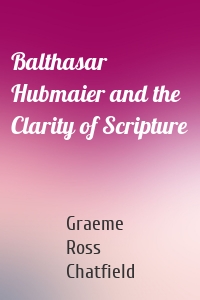Graeme Ross Chatfield
1 кн.
Balthasar Hubmaier and the Clarity...
During the sixteenth century, many Reformers echoed Erasmus's claim that the Scriptures were clear, could be understood by even the lowliest servant, and should be translated into the vernacular and placed in the hands of all people. People did not require the magisterium of the Roman Catholic Church to correctly interpret the meaning of the Scriptures. However, within a few short years, the leaders of the Magisterial Reformers, Martin Luther and Huldrych Zwingli, had created their own...
| Автор | Graeme Ross Chatfield |


